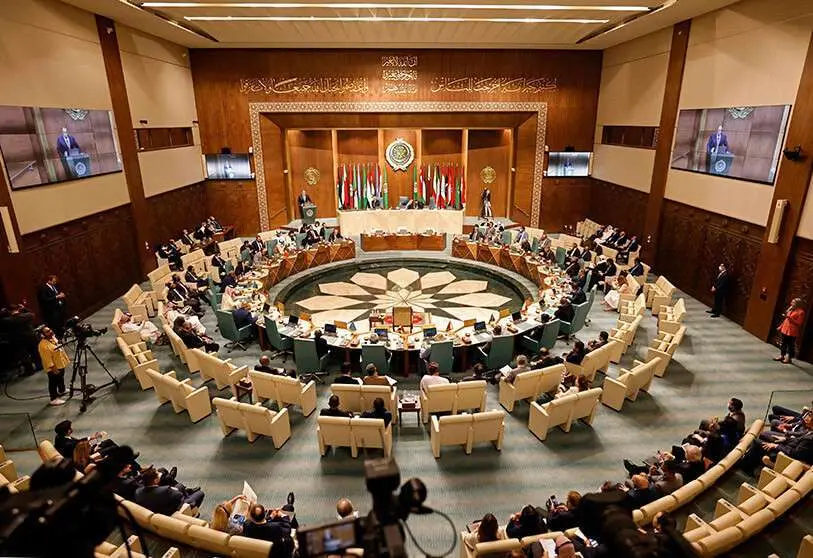La Cumbre de la Liga Árabe, terreno estéril para el optimismo

Expectations are low on the eve of the 31st Arab League summit. The 22 member states do not form a united and seamless bloc, quite the contrary. The different approaches to regional issues reveal that, far from building bridges, Arab countries are prone to openly display their disagreements. The Arab League's annual forums are the best example of this. The lack of consensus prevents initiatives to de-escalate tensions in a region that needs, perhaps more than any other, some stability.
The annual conclave in Algeria is in danger of following the same path. It is the first forum in two years to be held in a face-to-face format, now free of the usual COVID restrictions. But physical rapprochement does not guarantee political rapprochement, especially in a delicate context of the looming food crisis caused by Russia's invasion of Ukraine and the resurgence of some regional conflicts. There is no truce.
The host, Algeria, comes into the event emboldened. With the rotating presidency of the Arab League in hand and a role as a regional player bolstered by its energy reserves, it intends to assert its renewed foreign policy intentions. It interprets this as the time to be assertive after having put behind it the symptoms of internal weakness that preceded Bouteflika's fall, the mass protests in Hirak. Before doing so, however, he will have to overcome a number of obstacles.

Algerian Foreign Minister Ramtane Lamamra, who will chair the sessions on 1 and 2 November, held talks on Saturday night with some of his counterparts to advance positions. The preparatory meeting at ministerial level was held on Sunday and, according to the Emirati television channel Al Arabiya, resulted in a "breakthrough" in the condemnatory positions of several members on Turkey's and Iran's interference in the internal affairs of Arab states.
In particular, the parties referred to the various Turkish military interventions in Iraq, Syria and Libya, as well as the strategy of regional destabilisation undertaken by the Ayatollahs' regime through Hezbollah, Hamas and the Houthis in Yemen, its related militias. But the conversation did not materialise into an official statement after the end of the opening session.
Arab League Secretary General Ahmed Aboul Gheit listed the main themes of the summit in his opening speech. The first item on the agenda is the food crisis. "Food security indicators have deteriorated alarmingly. Not only because of the pandemic and subsequent events, but also because of other issues such as drought and weak agricultural investment," warned Abdoul Gheit. In this regard, Sudan proposes the adoption of a joint food security strategy.
M. Nasser Bourita a pris part, aujourd’hui à Alger, à la réunion préparatoire des ministres des Affaires Etrangères du Conseil de la Ligue des États arabes. pic.twitter.com/vR5xSOH7vL
— Maroc Diplomatie ?? (@MarocDiplomatie) October 29, 2022
Against the backdrop of the August 2021 breakdown in bilateral relations between Algeria and Morocco. Following Algiers' formal invitation to Rabat in the framework of the annual summit, a window of opportunity seemed to open for the resolution of the crisis. It was even rumoured that King Mohammed VI might represent the Alawi kingdom at the summit, something that seems unlikely after the treatment of Moroccan Foreign Minister Nasser Bourita. He was not even received at the airport by the Algerian authorities and arrived at the opening session only a few minutes early.
Other items on the agenda were the usual ones. The ongoing conflicts in Libya, Syria and Yemen and the state of the Palestinian cause. On the latter front, Algerian diplomacy flexed its muscles in mid-October after reconciling the Palestinian factions of Fatah and Hamas. This was a coup for Algiers, in contrast to the normalisation of relations with Israel formalised by other Arab countries in the framework of the Abraham Accords.
Arab League deputy secretary general Hossam Zaki said there was broad consensus on the issues raised by the organisation and that none would be postponed or deliberately circumvented. With each delegation agreeing on the issues on the table, it is unlikely that sensitive issues will be discussed, let alone truly transformative agreements reached for the region at this annual forum.

"Participants are likely to issue sweeping statements on Iran, oil production and other key issues, but their rhetoric is unlikely to translate into substantive policy changes or the resolution of internal disputes," write analysts Sabina Henneberg and David Schenker at the Carnegie Endowment for International Peace.
Dissatisfaction with some issues has led to the absence of key figures. This is the case of some Gulf countries that will not be represented in Algiers, such as the United Arab Emirates and Bahrain. Both normalised relations with Israel in November 2020, along with Morocco and Sudan. Analysts point out that this is precisely the reason for their non-appearances, and that neither Abu Dhabi nor Manama are willing to be reprimanded by their partners.
Saudi Arabia's Crown Prince Mohammed bin Salman will not attend the meeting on the recommendation of his medical team, nor will Syrian President Bashar Al-Assad, despite the intentions of the Algerian leadership, which sought to reinstate Damascus in the organisation after more than a decade of expulsion for its brutal repression of mass demonstrations during the Arab Spring, which preceded the civil war.








